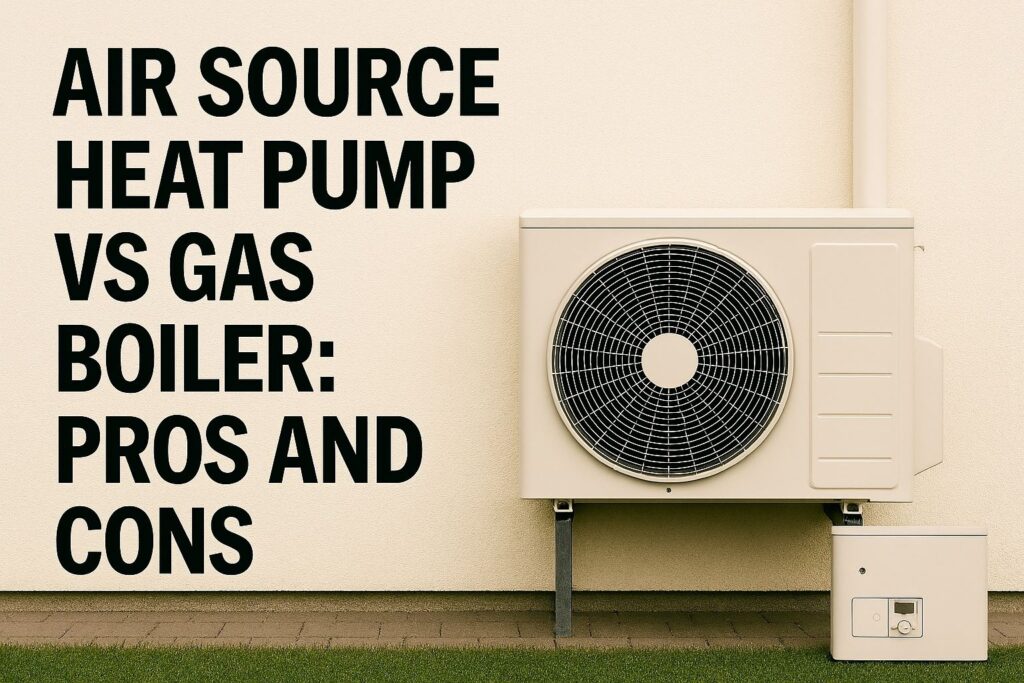Heating is a big decision for UK homes. Choosing the right system saves money and energy. The most widely used alternatives are air source heat pumps and gas boilers. Both of them have disadvantages and advantages. This guide outlines the disadvantages and advantages of both.
What is an Air Source Heat Pump?
An air source heat pump heats your home using air sucked in from outside. It is similar to a refrigerator, but reversed. The pump sucks heat from outside even in low temperatures.Then, it transfers the heat indoors. It runs on electricity, not gas. Heat pumps are growing popular in the UK.
What is a Gas Boiler?
A gas boiler uses natural gas to heat water. That hot water warms your home. It is connected to radiators and taps. Gas boilers are very common in UK homes. They provide fast heating and hot water. Most older houses still use gas boilers.
Pros of Air Source Heat Pumps
Air source heat pumps are energy efficient. They give more heat than the electricity they use. This makes them less expensive to utilize in the long run. They are environmentally friendly as they lower carbon emissions. Heat pumps utilize renewable grid electricity. They have a longer lifespan compared to gas boilers, and they usually last for 20 years. Heat pumps can be used for both heating and cooling. They have grants available in the UK to cover the costs.
Cons of Air Source Heat Pumps
Heat pumps are costly to install. The upfront price is higher than gas boilers. They need good insulation to work well. If your home leaks heat, they may struggle. Heat pumps provide lower water temperatures. You may need larger radiators or underfloor heating. They may not heat as fast as a boiler. In very cold weather, efficiency can drop. Outdoor units can be noisy if placed badly.
Pros of Gas Boilers
Gas boilers are cheaper to install than heat pumps. They provide instant hot water and heating. Boilers work well with existing radiators. They are familiar and easy to service. Gas is widely available in most UK areas. Replacement parts and engineers are easy to find. Many homeowners feel comfortable with boilers.
Cons of Gas Boilers
Gas boilers release carbon emissions. They use fossil fuel, which harms the environment. Running costs can rise as gas prices increase. Boilers need yearly servicing for safety. They typically last for 10 to 15 years, which is less than heat pumps. Very old boilers can be less efficient and expensive. The government will cut gas heating in the future.
Costs of Heat Pumps vs Gas Boilers
Heat pumps cost more upfront, often £7,000 to £13,000. Grants can lower this cost. Gas boilers are cheaper, usually £2,000 to £4,000 installed. But running costs may be higher over time. Electricity prices matter for heat pumps. Gas price changes affect boiler running costs. Over many years, heat pumps may save more.
Energy Efficiency
Heat pumps are more efficient than boilers. They can deliver three units of heat per unit of electricity. Boilers are less efficient, losing energy through combustion. Modern condensing boilers are better but still lower than pumps. Efficiency means lower bills and reduced carbon footprint.
Environmental Impact
Heat pumps are greener. They cut carbon gases and lower the use of fossil fuels. They work perfectly with solar panels or green energy deals. Gas boilers produce carbon dioxide every time they are operated. The UK aims to reduce gas heating use. Heat pumps support the goal of net zero emissions.
Home Suitability
Heat pumps suit well-insulated homes best. New builds or upgraded homes benefit most. Older homes may need insulation improvements first. Gas boilers suit older properties with existing systems. They heat quickly and work with standard radiators. But they may not meet future energy rules.
Grants and Support
UK homeowners can get a government grant for air source heat pumps. The ECO4 Scheme covers 100% cost, while the Boiler Upgrade Scheme covers up to £7,500. This lowers the high cost of installation. Gas boilers do get such grants too. The government plans to support greener systems at high priority.
Air Source Heat Pump Grant (100% Funding)
Some schemes such as ECO4 cover 100% of the upfront cost for an air source heat pump grant. This means you can switch to renewable heating without worrying about expenses. A fully funded grant gives you peace of mind, as you do not need to pay for equipment or installation. It also makes your home energy-efficient straight away. With no upfront payment, many families can enjoy warm homes, lower bills, and reduced carbon footprint stress-free.
Which System Should You Choose?
Select a heat pump if you desire to save money as well as enjoy long-term environmental advantages. Select a gas boiler if you desire lower initial costs. Consider the insulation of your property. Consider your own budget and future gas bans. Both systems can heat your home efficiently. The best choice is based on your situation.
Final Thoughts
Both gas boilers and air source heat pumps both have advantages and disadvantages. Heat pumps are environmentally friendly, efficient, and grant-aided. But they are expensive to buy and require good insulation. Gas boilers are cheaper and familiar. But they harm the environment and may be prohibited in the future. Your choice is determined by budget, house type, and long-term goals. The correct choice may save you money and save the planet.
